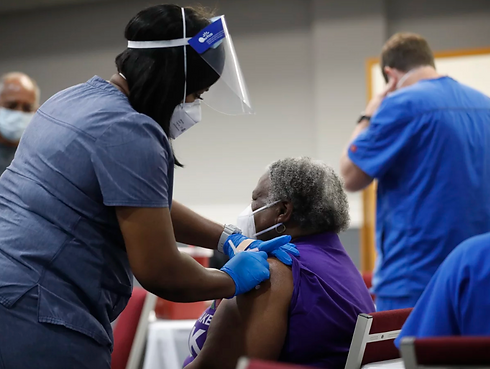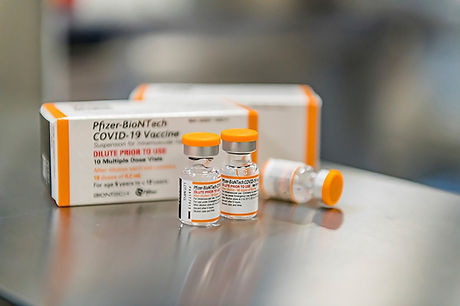COVID-19 News Highlights


Long Covid-19 may remain a chronic condition for millions
Long Covid is marked by remaining symptoms of COVID-19 which can last for four or more weeks and has cost Americans billions of dollars. Symptoms can be physical - such as difficulty breathing, joint pain, headache, and more - and also cognitive, with patients reporting unexplained mood changes, brain fog, and difficulties with language and general cognition. Scientists are currently working on drugs and tests to treat and diagnose Long Covid, respectively.

Airlines cancel hundreds of flights due to COVID-19 after dropping mask rules
A Swiss airline company, EasyJet has already canceled hundreds of flights since dropping mask mandates. With pilots and flight attendants being infected with COVID-19, staffing shortages have resulted in reduced schedules. Since the airline industry is vulnerable and the spread of the virus among staff can result in a cascading effect on society, experts believe that similar moves by U.S. airlines would backfire in many ways as more passengers would hesitate to take trips.

COVID disparities persist for Black Americans. But there are lessons for the future
Black people in the U.S. are still facing health disparities two years since the beginning of the COVID-19 pandemic. There is continued disproportionate burden the members of the Black community experience in terms of the pandemic. Solutions are needed to shorten the wide gap in physical, mental, and economic disparities.
N.J. reports 1,438 COVID cases, 15 deaths. CDC says ‘stealth omicron’ accounts for the most covid cases.
As the BA.2 variant spreads across the country, the CDC has linked it to over half of the COVID-19 cases in the country. This new "stealth" variant appears to be spreading more easily but generally is not causing severe illness in those who have contracted it. BA.2 also appears to spreading at much lower rates than the omicron surge in December and January.

Total case
New Admissions of Patients with COVID in NJ
January 2021 and 2022 have the highest number of new cases and in terms of ages, the 70+ years age group has the highest number of cases.
Total Hospital Utilization
Prevalent Hospitalizations of patients with COVID in NJ
Similar to the Cases graph, the hospitalizations graph also peaked in January 2021 and January 2022. And patients have 7 days of hospitalization on average.
Total of Deaths
A number of COVID deaths
The left axis indicates the cumulative deaths. As shown in the graph, the slope of the graph gets less steep as time goes by which shows that the number of deaths is decreasing.

About Me
Thoughts. Experiences. Inspiration.
I’m so glad you’ve arrived. Rutgers Community Reddit Post Analysis is where I share with you what interests me most, sparking your excitement so that you can nurture your own passions and projects. I hope you enjoy my site and all of the unique content I create. We all need something to motivate us. Take a look around; perhaps you’ll discover what exhilarates you. Are you ready to be inspired?
COVID-19 infection increases risk of serious blood clots 3 to 6 months later: Study
A new study suggests that being infected with COVID-19 increases the risk of developing serious blood clots three to six months after being diagnosed with the virus. Patients had a heightened risk of developing blood clots in the thigh or lower leg and pulmonary embolisms. The study also found an increased risk of any kind of bleeding upto two months after development of a COVID-19 infection.


As Yet Another Wave of Covid Looms, New Yorkers Ask: Should I Worry?
With the rise of the new omicron subvariant, BA.2 and mask mandates being lifted, COVID-19 cases have been steadily increasing across parts of New York City, potentially leading up to a fifth wave of the virus. With thousands of increasing cases and higher prevalence last seen during the worst of the pandemic, health officials expect the entire city to enter the medium risk category int the next two weeks. According to data, new infections are occurring in those younger than 35, but officials still worry about the negative impact should the virus spread to the elderly population. Residents are increasingly growing worried as the spread of the virus continues.

Study Joins Search for variant-proof Approach to SARS-CoV-2 Treatment
How can we treat COVID-19? More importantly, how can we treat the different health outcomes caused by different variants of the virus? How can we prevent different variants altogether? A team led by researchers in Pennsylvania explain how they have found a way to prevent the virus from replicating.

CDC Guidance: Over 90% of U.S. Population Can Drop Masks
As COVID-19 cases and deaths begin to decrease, the Biden administration is ready to move forward with the coronavirus pandemic. Previously, the Center of Disease Control recommended to wear masks indoor and public places as studies shows it decreases the spread of getting COVID-19. Despite the overall progress made, some experts believe that it is too soon in lifting the mask mandate.

U.S. far from normal with Covid deaths 10 times higher than seasonal respiratory viruses, report says
Despite mask mandates and vaccination requirements being lifted in some areas, COVID-19 is still a threat to many individuals. Experts compare the rate of COVID cases to other respiratory viruses and explain why it’s still very important to take proper precautions against the virus.

NJ updates post-mask mandate COVID-19 guidance for schools
After nearly two years of masks serving as primary prevention from COVID-19, Governor Murphy has lifted mask mandates for all schools K-12, but still urges parents and school staff to enforce mask mandates in certain high-risk situations when necessary. School districts, school boards, and childcare centers are still encouraged to communicate with their local healthcare departments in determining the next steps regarding universal masking policies

Appeals court halts COVID vaccine mandate for larger businesses
A federal appeals court on Saturday temporarily halted the Biden administration's COVID-19 vaccine requirement for businesses with 100 or more workers. The 5th U.S. Circuit Court of Appeals granted an emergency stay of the requirement by the federal Occupational Safety and Health Administration that those workers be vaccinated by January 4 or face mask requirements and weekly tests.
The latest on Covid-19 vaccines for children
Currently, the vaccine is available for ages 16 and higher and allowed for children 12 to 15 in emergency cases. The FDA advisory meeting concluded with a 17-0 vote in favor of supporting the authorization of Pfizer's vaccine in emergency cases for children ages 5 to 11. Looking forward, the FDA will make a final decision on authorizing Pfizer’s vaccine with the committee’s vote in mind. The US Centers for Disease Control and Prevention's independent advisory committee will then meet in the beginning of November to vote on whether or not to recommend the vaccine for this age group.

The Delta Variant
Data indicate that Delta is 40-60% more transmissible than Alpha and almost twice as transmissible as the original Wuhan strain of SARS-CoV-2. Furthermore, significantly more viral particles have been found in the airways of patients infected with the Delta variant. A Chinese study reported that viral loads in Delta infections were ~1,000 times higher than those in infections caused by other variants. In response this information, the World Health Organization (WHO) regards Delta as “the fastest and fittest” variant so far.

Facebook News Consumers Less Likely to Be Vaccinated, Survey Finds
This article discusses the findings of a survey conducted by Rutgers researchers to better understand how the media and news outlets affect the public's opinions on taking the vaccine. This article discusses how facebook users proved to be less likely to be vaccinated, including compared to those who watch Fox news.

Doctors Worry That Memory Problems After COVID-19 May Set The Stage For Alzheimer's
Researchers at UT Health San Antonio are studying patients like Hernandez, trying to understand why their cognitive problems persist and whether their brains have been changed in ways that elevate the risk of developing Alzheimer's disease.
New survey captures trends in social isolation during the pandemic
While Americans try to get back to normal after the COVID-19 pandemic shut down much of the country for more than a year, a new study found that unemployed, less educated and lower socioeconomic individuals do not have the support of family and friends that they need to fully recover.

Stories From COVID Front Lines
Throughout the pandemic thousands of healthcare workers have been giving their best to combat COVID19 and protect the general public. Included in this fight are healthcare workers graduated from Rutgers. In this article you can hear the firsthand experiences from healthcare professionals who graduated from the Rutgers affiliated medical, nursing, or pharmacy school. Their experiences give us a unique insight into what it's like being on the front lines.

Rutgers Researchers Receive Funding to Develop COVID-19 Breathalyzer Test
Rutgers researchers have once again broken through COVID-19 testing barriers. With the development of their new breathalyzer test the world will have access to testing that determines if someone is infected within minutes on the spot. This new technology will make the ease of wheeling our way out of the pandemic a lot easier! This project is still within the works but with its recent funding it’s highly likely that we could expect further progress soon.

Rutgers Develops Test to Detect New Emerging Coronavirus Variants
Researchers were recently able to develop a rapid new test that can differentiate the COVID-19 variants in a little over one hour – which is much shorter than the multiple days required by current tests, also being a lot easier to build and develop as well. Currently, researchers are working to develop their test to further to better differentiate among the three main viral variants and factoring in new variants as they emerge.

The Vaccine Mandate for Return to Campus
Recently, Rutgers University was one of the first universities to take a stance on requiring students to have taken the COVID-19 vaccine to return to campus in the Fall 2021 semester. Although a controversial decision, many believe that this is the correct step to take towards revitalizing society back to normal.

New Jerseyans Relaxing Social Distancing Measures, New Survey Finds
Researchers from Rutgers University–New Brunswick, Northeastern, Harvard and Northwestern Universities recently conducted a survey on health seeking behaviors related to COVID-19. Their results, published in "The COVID States Project" reveal that proportions of residents going to gyms, bars and restaurants, and taking public transit have all risen. However, the prevalence of those consistently wearing a mask has also risen. Researchers assume that this is due to the widespread consensus that transmission is primarily respiratory.


Rutger’s Center for COVID-19 Response and Pandemic Preparedness (CCRP2)
This past year Rutgers decided that they were going to be the first to open a new center for COVID-19 research. Through this center there was a great amount of accomplished projects being conducted in the past year. Some awarded projects from the center listed below:
Computational Tools for COVID-19 Mpro Inhibitor Design and Precision Medicine Drs. Darrin York and David Case
The essential role of protein motions in therapeutic design: understanding how dynamics regulate SARS-CoV-2 spike RBD-ACE2 interactionsDr. Jean Baum
Fragment based ligand discovery against SARS-CoV-2 papain-like proteaseDr. Sagar Khare (with Drs. Nilgun Tumer and Xiao-Ping Li of Plant Biology)
Structural and Small-Molecule Binding Studies of SARS-CoV-2 Polyproteins and Proteins Dr. Edward Arnold (with Dr. Jason Kaelber of IQB)
Super-effective face masks with internal decontamination of virus particles Dr. Joachim Kohn (with Drs. Sanjeeva Murthy and Kim-Phuong Le of NJCBM)
RUCDR Infinity Biologics Saliva Test
In the height of the pandemic, Rutgers Researchers were able to develop a revolutionary way to test people for COVID-19 through the means of a simple saliva test. This method made is both non invasive and still as effective and sensitive results in a quicker time frame compared to swab testing. This test was later able to be approved by the FDA and went into full manufacturing. Today, over 6 million saliva tests have now been conducted and only more to go!

Rutgers Researchers Examine a Correlation Between COVID-19 and Alzheimer’s
Both COVID-19 and Alzheimer’s Disease have had devastating and disproportionate effects on African Americans. Three Rutgers University researchers seek to address important gaps in understanding not only the cognitive, neural, and immunological consequences of COVID-19 in older African Americans but also how those consequences can impact this population’s risk for Alzheimer’s Disease.

Rutgers Researchers Develop a MicroBiota Formula to Help High Risk Patients Fight COVID-19
A Rutgers scientist has invented an early treatment for COVID-19 to prevent severe complications and hospitalizations in patients with prediabetes or diabetes mellitus using a novel ecological approach focused on managing the gut microbiota. Clinical trial approved by the FDA to start in February.

Who Should be Getting Vaccinated Where Supplies are Limited?
It's been two years since vaccines against Covid have been approved by the Food and Drug Administration (FDA) and some countries still have limited supplies. These countries tend to follow vaccine allocation guideline published by The World Health Organization (WHO) which recommends vaccinating the elderly first. However, an analysis published by Rutgers research suggests otherwise. To learn more click the link below.






